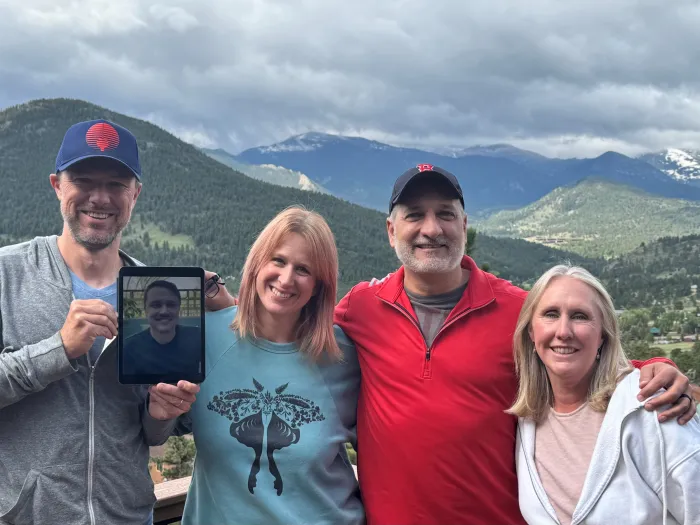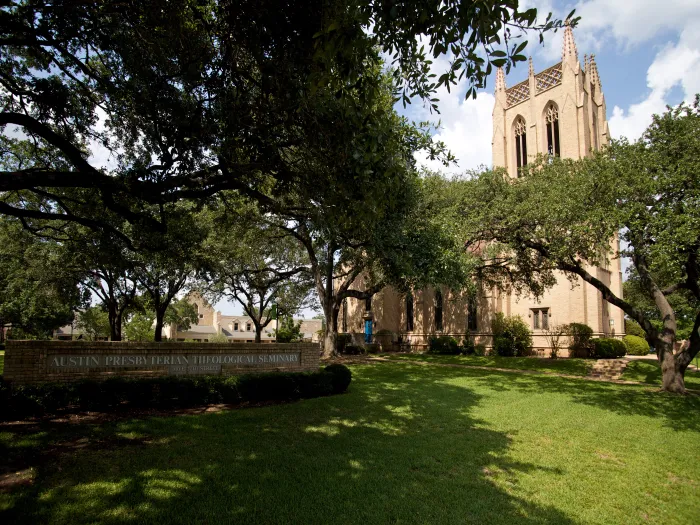The land of the free?
Karl Barth Conference focuses on the US prison system

“Less crime and less incarcerations are profound blessings for a society,” Dr. Keith Humphreys, a Stanford University professor of psychiatry and behavioral science, wrote in an op-ed published by The Atlantic last week about the policy changes that have resulted in a 60% decrease in America’s prison population.
Such theo-ethical hope has been affirmed by the General Assembly of the Presbyterian Church (U.S.A.) since it passed resolutions against for-profit prisons in 2003 and 2016. Ever since, the PC(USA)'s Office of Public Witness has conducted workshops nationally to educate Presbyterians on criminal justice reform and how public policy affects the rate and costs of incarceration, impacting state budgets in the short term but more importantly, individuals, families and communities over the long term. In 2022, the 225th General Assembly highlighted the injustices of the cash-bail system and its long-term impact on the families of the incarcerated with the Hands and Feet campaign.
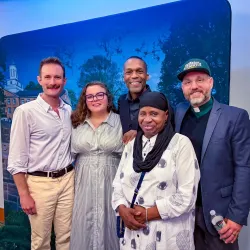
From June 15–18, the Center for Barth Studies at Princeton Theological Seminary, the Prison Studies Program at Duke Divinity School, the Calvin Prison Initiative at Calvin College and the Partnership for Religion and Education in Prisons (PREP) at Drew Theological School co-sponsored the 2025 Karl Barth Conference titled “The Incarcerated God: Thinking With and Beyond Barth on the Prison System” to deeply engage the meaning and impact of mass incarceration on society through a shared Reformed tradition.
“For more than 40 years, the United States — a nation that putatively cherishes freedom — has had one of the largest prison systems in the world,” wrote Humphreys just a week before the nation celebrates Independence Day on Friday. The piece claimed that mass incarceration has been so pervasive in this country that prison reform goals of a 50% reduction of prison populations were seen as a fantasy. But a steady decline in incarceration rates since peaking at 1.6 million Americans in 2009 suggests that in the near future, U.S. prisons may hold only 600,000 Americans.
Humphreys credits the improvement to a move away from large incarcerations of youth and longer sentencing that dominated the latter half of the 20th century and led to greater rates of recidivism among a population imprisoned at an early age with fewer options upon release. In a political climate so often focused on the short term, the falling incarceration rate exemplifies how policy decisions are actually a long game. As prisons empty, will states feel pressure to change policy to keep up the Department of Corrections and private prison industries that have anchored many local economies?
“In all 50 states, the cost to imprison someone for a year significantly exceeds the cost of a year of K–12 education,” argued Humphreys, who added that closing prisons is not just good for the incarcerated and their families but also better for the financial savings and human prosperity of communities. Humphreys wrote that “accelerating the de-prisoning of America is worthwhile and possible.”
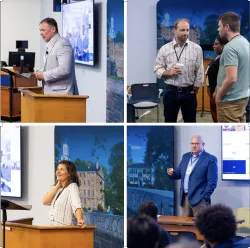
A similar ethos of possibility and hope spread throughout the 2025 Karl Barth Conference, where presenters examined Barth’s theological insights in relation to incarceration, justice and liberation, fostering a critical and constructive dialogue on addressing systemic oppression. The conference featured scholars working in theological education in prisons, such as Todd Cioffi and Shawn England from the Calvin Prison Initiative at Calvin University, Dr. Chris Boesel from PREP at Drew Theological School, and Drs. Sarah Jobe and Douglas Campbell from the Prison Studies Program at Duke Divinity School.
Dr. Benjamin Chavis, one of the original Wilmington Ten who was wrongfully convicted and sentenced to prison for crimes he did not commit, opened the conference with a moving plenary speech and set the stage for a major focus of the conference, according to its organizer, Kait Dugan, which was to center the voices of those currently or formerly incarcerated.
“Barth studies can often become abstract and scholastic, and I wanted to avoid objectifying those who are imprisoned,” Dugan wrote on the Barth Center’s Substack. “These are real people and real urgent issues we are discussing.”
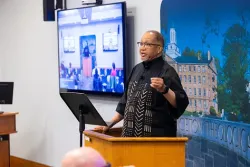
On June 15, Shawn England, a graduate of the Calvin Prison Initiative (CPI) who had been released last year, gave a response paper to Dr. Todd Cioffi, his former professor, and followed it by leading a video discussion panel with four CPI students at Handlon State Prison in Michigan. The next day, Lyle C. May, an incarcerated journalist who has been on death row since 1999, responded to a paper by Dr. Chris Boesel. His presentation was interrupted by a series of dropped calls and automated messages from the Department of Corrections. Dugan described the effect of these technical difficulties as having “left a mark on everyone in the audience in ways we could not have planned for.”
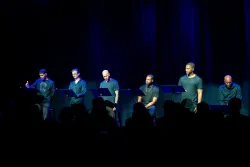
Later that evening, Princeton University’s theater department hosted a sold-out performance of “Count: Stories from America’s Death Row,” directed by A.J. Shaw and performed by six Broadway actors. Dugan explained how the conference leadership included activists and artists as a way of representing the practical struggle to change the prison system and as an effort to reach the creative expression needed “to witness to the full reality of incarceration.”
“These goals ultimately took various concrete forms throughout the four-day event,” said Dugan, who pointed out that “to start, the entire conference was catered by three friends — David Lewis, Jarrette Atkins and Fritz Georges — who were incarcerated together and started a catering business called Macrobites after they were released.”
While “almost everyone engaged with Barth and his dogmatics,” Dugan admitted that “the conference was not really about Barth at the end of the day.”
“No one was overly concerned with either proving they could read him right or show how wrong he was about this or that,” Dugan said. “The conference was about something so much more important than Karl Barth: the love and freedom God has given to those whom society has imprisoned.”
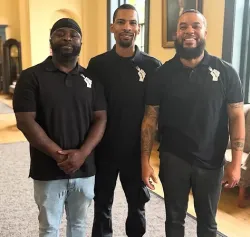
In response to the data about America’s incarceration rates, the Rev. Dr. Alonzo Johnson, who supports the PC(USA)’s Committee on the Self-Development of People, said he hopes the wider society recognizes how communities of faith working on criminal justice reform and the realities that contribute to recidivism have contributed to the declining rates of incarceration. However, he expressed concern about “various configurations of incarceration taking hold in our society” that may not be reflected in statistics about brick-and-mortar prisons, such as the use of immigrant detention centers or “leg bracelets and these types of electronic monitoring that place stress on families.”
“Will they have access to productive means of self-development?” asked Johnson. Several of SDOP’s partner organizations address these realities. “I am hoping that a decline in prison numbers also correlative to an increase in gainful employment opportunities, access to education, and changes in law enforcement procedure [reduced cash bail and prosecutorial misconduct],” said Johnson.
Through workshops at Ecumenical Advocacy Days, a series of webinars and a video series titled “The Struggle is Real,” SDOP has highlighted the urgent moral issues around mass incarceration and those trying to address its systemic effects. “Brick-and-mortar prisons may be becoming outmoded, but mass incarceration and its mix of racism, classism and profit makes me wonder and fear what the new age of mass incarceration and technology will look like,” said Johnson.
SDOP has funded several projects by formerly incarcerated citizens, including EPOCA (Ex-Prisoners and Prisoners Organizing for Community Advancement) in Worcester, Massachusetts; Why Not Prosper in Philadelphia; the Genesis Youth Organizing Internship Project in Oakland, California; VOTE (Voice of the Experienced) in New Orleans; and the Welcome Back Project in Missoula, Montana.
The Rev. Jimmie Hawkins, the PC(USA)'s advocacy director, serves on the board of directors of the National Religious Campaign Against Torture (NRCAT), which was also a part of the Barth conference. Among NRCAT leadership is an 11-person U.S. Programs Prison Advisory Council that addresses the impact of solitary confinement on prisoners and mass incarceration on society.
“Presbyterians should care about the incarceration rates of the United States of America because we have turned from offering rehabilitation for the incarcerated to punitive punishment,” said Hawkins. Like Humphreys, Hawkins sees the positive impact that calls for criminal justice reform in the early part of this century have made but cautions that the work must be sustained.
“The 60% decline in incarceration rates is a sign of hope, but there is much more work to understand and to be done to understand the realities of those in the criminal justice system," Hawkins said. "Punishment continues long after one’s sentence has been served as fines continue. Formerly incarcerated persons cannot receive social services, find employment, and, for many, vote."
You may freely reuse and distribute this article in its entirety for non-commercial purposes in any medium. Please include author attribution, photography credits, and a link to the original article. This work is licensed under a Creative Commons Attribution-NonCommercial-NoDeratives 4.0 International License.



